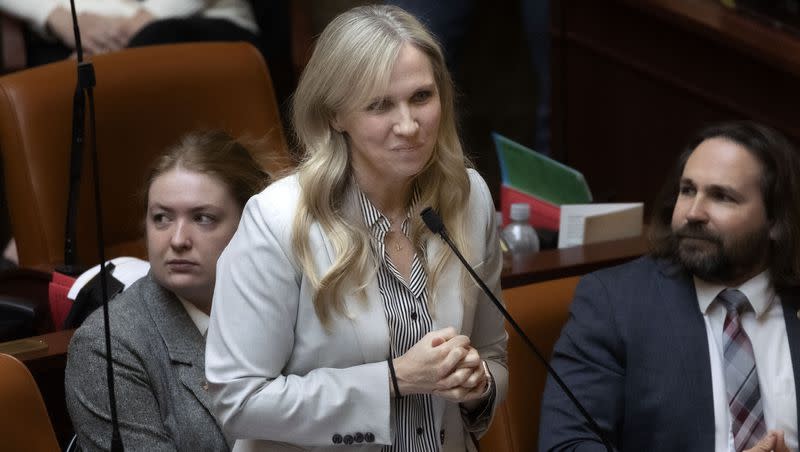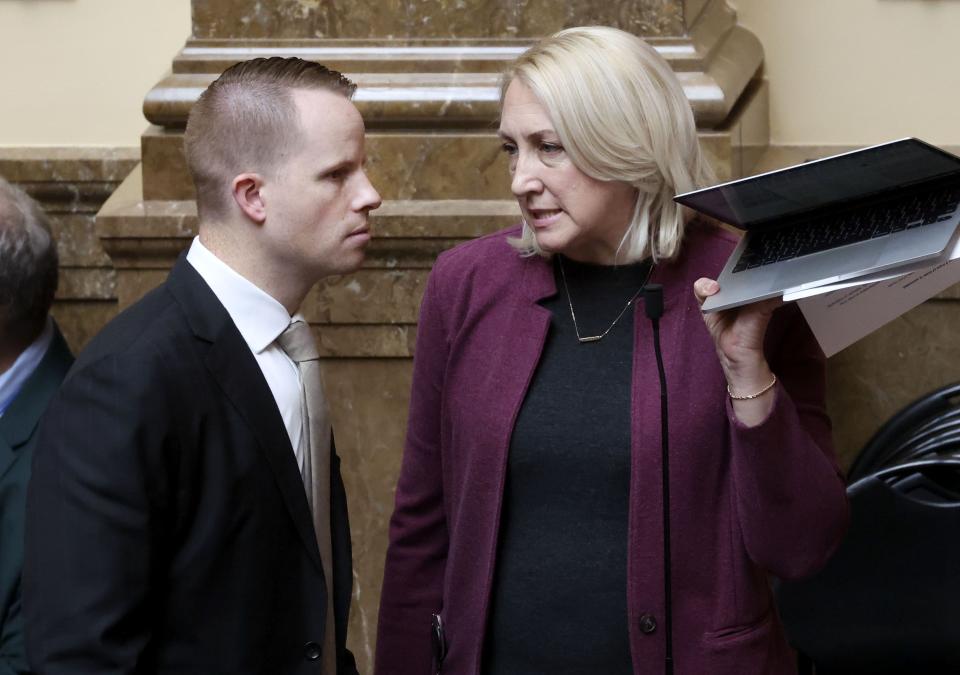Utah lawmakers pass DEI overhaul, Gov. Spencer Cox expected to sign bill

- Oops!Something went wrong.Please try again later.
- Oops!Something went wrong.Please try again later.
State Republican lawmakers sent a bill banning “discriminatory” DEI practices to the governor’s desk Friday after two weeks of extended debate and revision. Utah Gov. Spencer Cox is expected to sign the legislation into law.
The Utah House took a final concurrence vote on the measure during Friday floor time, approving Senate amendments to HB261 with 60 Republican “yeas” to 14 Democratic “nos.”
The state’s GOP supermajority passed the bill easily with a party-line vote of 23-6 in the Senate on Thursday following the House’s initial passage on Jan. 19. The bill will now head to Cox, who signaled in December his eagerness to print his signature on legislation prohibiting diversity statements and other DEI initiatives.
Senate Education Committee Chair John Johnson, R-North Ogden, told the Deseret News on Wednesday, immediately following a meeting with Cox, that he had no doubt the governor would sign the bill.
The bill, titled “Equal Opportunity Initiatives,” is one of the highest profile “culture war” measures to emerge from the 2024 legislative session so far. If signed into law, it would overhaul diversity, equity and inclusion programs at public institutions in the state and replace them with resource centers open to all “high risk” individuals.
“The intent of this bill is that we treat everyone as an individual, taking into account all their circumstances, capabilities, opportunities and experiences with the goal of providing equal opportunities for everyone,” said the bill’s sponsor, Rep. Katy Hall, R-South Ogden, prior to the House concurrence vote.
The bill aims to outlaw DEI trainings, requirements, programs and offices at public universities, schools “or any other institution of the state” that engages in what the legislation calls “prohibited discriminatory practices,” which includes policies that promote differential treatment based on race.
The bill requires public institutions to maintain neutrality on political topics. It also ensures that all students are able to access programs that provide student success resources and mandates that institutions of higher education conduct trainings and surveys focused on free speech.
State funding can be withheld if institutions fail to address violations of these requirements, the bill says.
“It is asking our state entities to provide an environment where everyone, if they work hard enough, and if they want, can succeed,” Hall said. “It will also provide an environment where civil discourse and a marketplace of ideas can flourish again on our university campuses.”

Equal Opportunity Initiatives joins a spate of similar measures across the country seeking to ban DEI initiatives, reaffirm academic freedom at universities and reestablish political neutrality in state hiring and training programs. But Hall and Senate floor sponsor Sen. Keith Grover, R-Provo, have said their proposal is a conciliatory third way, not based on any model legislation, that reclaims the best goals of DEI while abandoning its divisive side effects.
Related
Utah lawmakers say they’re creating national model for ‘positive’ DEI alternative
Utah Democratic lawmakers respond to DEI ban, transgender bathroom bill
“The reason we’re doing this now is because it needs to happen. We need to now start providing equality of opportunity for all students,” Grover said during Wednesday’s floor debate.
Grover has said the “meat of the bill,” and the part he’s most excited about, is the funding and guidelines for each public university to create or maintain “student success centers” that will provide special resources for all “at risk” students based on their individual circumstances.
Lawmakers debate DEI bill
“Diversity, equity and inclusion” refers to policies meant to create an environment of equal opportunity in colleges, schools or in the workplace with a focus on groups that have faced historic discrimination. It can take the form of diversity statements in hiring, employee trainings and programs intended for particular identity groups.
But whereas proponents of DEI initiatives say they help to redress societal disparities and make all students or employees feel welcome, Hall and Grover have argued that DEI programs can create a chilling effect in academic institutions, often ruling out conservative viewpoints, and highlight racial divisions while showing little effect on participants’ actual sense of belonging.
In explaining her vote in opposition to the bill, House Minority Leader Angela Romero, D-Salt Lake, worried about “unintended consequences,” not having to do with the substance of the bill, but surrounding what the legislation signals to minority communities.
“Taking out diversity, equity and inclusion, it just doesn’t send the right message to many of us,” Romero said.
During the weeks since the bill was introduced, Hall, Grover, and others have made great pains to clarify the messaging around HB261.
Rep. R. Neil Walter, R-St. George, who spoke in favor of the bill during both floor and committee time, clarified that unlike measures in other states, the bill would not automatically defund current programs or offices on college campuses.
“We are very much concerned about making sure that we help people have a successful experience in navigating higher education,” Walter said. “We’re not trying to, in this bill, do anything to take resources away from minorities or other underserved communities.”
Related
Lawmakers on both sides of the aisle, and concerned community members during two public hearings, have voiced concerns over how the bill’s broad scope might affect teaching strategies, data collection, public-private partnerships, health care initiatives targeted toward specific identity groups and even the 2034 Winter Olympics.
In response to each concern, Hall and Grover have said their bill would allow current practices to proceed in almost every instance unless they violate the bill’s restricted practices. The bill’s sponsors have worked with critics of the bill and stakeholders, including the Utah Board of Higher Education and University of Utah President Taylor Randall, to craft language that avoids unintended consequences.
Randall told the Deseret News Thursday morning that the university would wait to comment until final revisions were made. But Randall readily agreed that the process of amending the bill has been collaborative.
“I will say that the collaboration has been good,” Randall said. “The bill has changed in a variety of ways dramatically. We’ve appreciated the conversation. I think it’s built a shared understanding around the concerns of this issue but also the potential benefits that we also have for just continuing to focus on student success in a diversifying state.”
What does, and doesn’t, Utah’s DEI bill prohibit?
According to the legislative text, banned DEI practices would include maintaining any policy that:
Promotes differential treatment in employment status or program participation based on “personal identity characteristics,” like race, sex or religion.
Asserts in trainings or procedures that individuals with one personal identity characteristic are inherently superior, privileged, oppressed or culpable for past actions, because of their personal identity characteristics.
Requires statements of an individual’s position on DEI initiatives, or topics like anti-racism and critical race theory, before taking action in regards to employment, admissions or state financial aid, among other things.
Carries the title “diversity, equity, and inclusion.”
The bill does not prohibit policies required under state or federal law related to discrimination or harassment, including Title VI, VII and Title IX provisions. The bill contains carve outs for grants, academic research and course material, and requirements needed to maintain eligibility for athletics, accreditation and federal programs. It also includes an exception for previous agreements entered into between the University of Utah and the Ute Indian Tribe.
No training or office will be affected by HB261 unless they violate the bill’s “prohibited discriminatory practices.” The same goes for special ed programs and student groups, Hall and Grover have said.
Related

